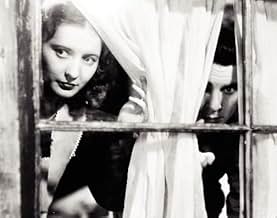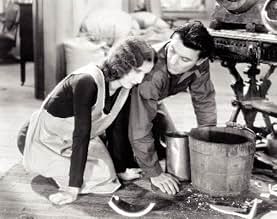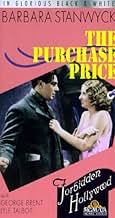IMDb-BEWERTUNG
6,4/10
2035
IHRE BEWERTUNG
Füge eine Handlung in deiner Sprache hinzuA torch singer becomes a farmer's mail-order bride.A torch singer becomes a farmer's mail-order bride.A torch singer becomes a farmer's mail-order bride.
- Regie
- Drehbuch
- Hauptbesetzung
Mae Busch
- Queenie - Girl on Train
- (Nicht genannt)
Nick Copeland
- Skins' Pal at Shivaree
- (Nicht genannt)
Mike Donlin
- Tom Buchanan - Man at Shivaree
- (Nicht genannt)
Harrison Greene
- Man in Hotel Lobby
- (Nicht genannt)
Crauford Kent
- A.C. Peters - The Banker
- (Nicht genannt)
Matt McHugh
- Waco - Fields' Henchman
- (Nicht genannt)
John 'Skins' Miller
- Skins - The Accordion Player
- (Nicht genannt)
Carlyle Moore Jr.
- Hotel Desk Clerk
- (Nicht genannt)
Edmund Mortimer
- Dance Extra
- (Nicht genannt)
William H. O'Brien
- Waiter in Opening Nightclub Scene
- (Nicht genannt)
Henry Otho
- Extra in Beer Hall and at Shivaree
- (Nicht genannt)
Empfohlene Bewertungen
This peculiar but interesting drama has Barbara Stanwyck as a weary nightclub torch singer with a "who cares?" attitude. To escape her underworld boyfriend, she decides to hide out in the bleak plains of North Dakota as a mail-order bride. As her shy farmer husband, the normally debonair George Brent is almost unrecognizable in a pair of overalls, but gives a sensitive characterization. The bulk of the plot follows the growing feeling between the reserved country mouse' and the tough city mouse', complicated by several villains. Tough guy director William Wellman keeps things moving at a clip, and uses his low budget wisely to stage several good set-pieces, including a drunken shivaree for the happy couple. In the supporting cast, Leila Bennett stands out as a plain-talking maid.
The appeal of this somewhat run-of-the-mill film is Barbara Stanwyck in an early display of her mega-watt star power and her ability to turn mediocre material into something special.
Her character doesn't make much sense: a nightclub singer from the city who wants to get away from the bootlegger boyfriend hounding her and so agrees to an arranged marriage with a farmer up in the wilds of North Dakota! The bootlegger (played by Lyle Talbot) isn't threatening or abusive, so one wonders why Stanwyck needs to go to such great lengths to avoid him -- keep wondering, because the movie never explains it. But if you can swallow that, then you can easily swallow the fact that this urban good-time gal seems to know all about how to run a farm.
Which brings me back to Stanwyck. The movie's premise isn't remotely plausible, but Stanwyck somehow makes it so through the confidence of her performance. I really think she could make anything worth sitting through just for the pleasure of watching her.
The film does provide an interesting look at what farm life in the early days of the 1930s was like, a lifestyle I've only seen recreated in more modern-day movies.
Grade: B-
Her character doesn't make much sense: a nightclub singer from the city who wants to get away from the bootlegger boyfriend hounding her and so agrees to an arranged marriage with a farmer up in the wilds of North Dakota! The bootlegger (played by Lyle Talbot) isn't threatening or abusive, so one wonders why Stanwyck needs to go to such great lengths to avoid him -- keep wondering, because the movie never explains it. But if you can swallow that, then you can easily swallow the fact that this urban good-time gal seems to know all about how to run a farm.
Which brings me back to Stanwyck. The movie's premise isn't remotely plausible, but Stanwyck somehow makes it so through the confidence of her performance. I really think she could make anything worth sitting through just for the pleasure of watching her.
The film does provide an interesting look at what farm life in the early days of the 1930s was like, a lifestyle I've only seen recreated in more modern-day movies.
Grade: B-
THE PURCHASE PRICE is one of ten films Barbara Stanwyck for Warner Bros. in the early 1930's when she was under non-exclusive contracts to the studio and Columbia Pictures. The Columbia films are often quite good, several of them directed by Frank Capra, but most of the Warner Bros. she made in this period are little more than potboilers, films rarely running over 70 minutes with few ambitions. This title is among Stanwyck's weakest films although it is raised immensely by a typically fine Stanwyck performance making it much more interesting and appealing than it should be.
Stanwyck stars as Joan Gordon, a sexy nightclub torch singer who is the mistress of married bootlegger Lyle Talbot. This duo apparently have quite an open relationship as Talbot isn't too bothered by the fact that Stanwyck is also seeing society boy Hardie Albright who wants to marry her. When Albright finds out about Stanwyck's relationship with Talbot he dumps her, crushing Barbara's dream of a quiet life as somebody's wife. Wanting to get away from Talbot's lair, she skittles to Montreal and begins performing under a new name. While in Canada, she befriends hotel maid Leia Bennett whom she later learns is about to become a "mail order bride" - and has used Stanwyck's picture to net her fiancée! When Stanwyck sees some of Talbot's associates she knows it's only a matter of time before he comes up to Canada to get her so she offers Bennett $100 in exchange for letting her take her place as the wife-to-be ("Wow, a $100" Leia exclaims, "I can get a city husband for that!") Stanwyck then travels to North Dakota to meet "her" groom, poor farmer George Brent. They are married but the wedding night proves to be a disaster with Barbara brushing off George's crude attempt at love making. Infuriated, Brent refuses to have anything to do with after this on a personal level, Stanwyck simply becomes a wife on all levels except romantically.
This little film moves quickly and is entertaining but incredibility is all over the film. One little forgotten tidbit is that while Leia Bennett passed off Stanwyck's photo as her own she apparently used her own name but Barbara uses her real name of Joan while in North Dakota! And just why Stanwyck would so harshly reject Brent after no doubt having been pawed by scores of men far more rougher and less attractive? It makes about as much sense as Brent's willful refusal to forgive her for this one night of rejection (wouldn't many a man in this era have found a new bride less than at ease their first night together?) when it's clear she soon wants to make amends. There's also the little fact that Stanwyck is portrayed as a straight shooter, early in the film she insists to Albright she would have told him about Talbot - yet she doesn't give Brent a clue about the relationship or her past until Talbot shows up unannounced sometime into their marriage!
Barbara Stanwyck fully earns her reputation as an outstanding actress, she always seems sincere and real even in this silly little story. She's also stunningly beautiful in scenes where she is presented "naturally" without city artifice and heavy makeup. The big surprise for me was George Brent's excellent performance. Not known for being one of the more expressive of actors, Brent seems perfectly cast as the inexpressive, reserved farmer and was seldom more attractive (although being cast as about the only non-coarse hick caricature among the North Dakotans perhaps helps). He is terrific here and I can't remember him giving a better film performance. Lyle Talbot is also very good looking and so good-natured one has to wonder just why Stanwyck keeps running away from him unless she really DOES want to be just a typical housewife. Most of the supporting roles are fairly small and in bits one can see silent favorites Snub Pollard (as one of the locals) and Mae Busch (as an earthy blonde on the train with Stanwyck also in route to her mail-order man).
Stanwyck stars as Joan Gordon, a sexy nightclub torch singer who is the mistress of married bootlegger Lyle Talbot. This duo apparently have quite an open relationship as Talbot isn't too bothered by the fact that Stanwyck is also seeing society boy Hardie Albright who wants to marry her. When Albright finds out about Stanwyck's relationship with Talbot he dumps her, crushing Barbara's dream of a quiet life as somebody's wife. Wanting to get away from Talbot's lair, she skittles to Montreal and begins performing under a new name. While in Canada, she befriends hotel maid Leia Bennett whom she later learns is about to become a "mail order bride" - and has used Stanwyck's picture to net her fiancée! When Stanwyck sees some of Talbot's associates she knows it's only a matter of time before he comes up to Canada to get her so she offers Bennett $100 in exchange for letting her take her place as the wife-to-be ("Wow, a $100" Leia exclaims, "I can get a city husband for that!") Stanwyck then travels to North Dakota to meet "her" groom, poor farmer George Brent. They are married but the wedding night proves to be a disaster with Barbara brushing off George's crude attempt at love making. Infuriated, Brent refuses to have anything to do with after this on a personal level, Stanwyck simply becomes a wife on all levels except romantically.
This little film moves quickly and is entertaining but incredibility is all over the film. One little forgotten tidbit is that while Leia Bennett passed off Stanwyck's photo as her own she apparently used her own name but Barbara uses her real name of Joan while in North Dakota! And just why Stanwyck would so harshly reject Brent after no doubt having been pawed by scores of men far more rougher and less attractive? It makes about as much sense as Brent's willful refusal to forgive her for this one night of rejection (wouldn't many a man in this era have found a new bride less than at ease their first night together?) when it's clear she soon wants to make amends. There's also the little fact that Stanwyck is portrayed as a straight shooter, early in the film she insists to Albright she would have told him about Talbot - yet she doesn't give Brent a clue about the relationship or her past until Talbot shows up unannounced sometime into their marriage!
Barbara Stanwyck fully earns her reputation as an outstanding actress, she always seems sincere and real even in this silly little story. She's also stunningly beautiful in scenes where she is presented "naturally" without city artifice and heavy makeup. The big surprise for me was George Brent's excellent performance. Not known for being one of the more expressive of actors, Brent seems perfectly cast as the inexpressive, reserved farmer and was seldom more attractive (although being cast as about the only non-coarse hick caricature among the North Dakotans perhaps helps). He is terrific here and I can't remember him giving a better film performance. Lyle Talbot is also very good looking and so good-natured one has to wonder just why Stanwyck keeps running away from him unless she really DOES want to be just a typical housewife. Most of the supporting roles are fairly small and in bits one can see silent favorites Snub Pollard (as one of the locals) and Mae Busch (as an earthy blonde on the train with Stanwyck also in route to her mail-order man).
Of course this delicious tour-de-force is totally incredible... but WOW! You can't take your eyes off the screen in case Wellman gives his heroine whiplash as she moves from plushly-kept woman in Manhattan to mail-order farmer's bride in North Dakota. From take-out at Tiffany's to hauling coal nuggets 20 miles through a blizzard. From igniting the lust in men with her daring chanteusing to putting out the fire villains set to her and hubby George Brent's last-hope crop of wheat. All in just over 60 minutes!
This is sold as "pre-Code," as if there will something risqué or shocking, but certainly by today's standards -- or lack thereof -- and even by those of the era, there is nothing to bother your grandma or even your (reasonable) preacher.
There is something, though, to excite the movie-lover: Barbara Stanwyck's performance.
Apparently in real life she was a pretty tough cookie, and certainly she played some hard women in many of her films.
In "The Purchase Price" her character refers to herself as having maintained some sort of a reputation and in fact she comes across as a very nice, even admirable person.
She certainly looked good, with a gentle strength, or strong gentleness, poking out of the chorus girl/mistress persona.
The story, though, never does make much sense, and why the people did what they did, except for the character played by Lyle Talbot -- in a great role for him, and excellently played -- is not clear.
One more glaring error: North (brrrr) Dakota doesn't have any hills, and the shots of snow-capped peaks showed that wherever this film was shot, it sure wasn't North (brrrr) Dakota, you betcha.
One scene of plowing showed the genuine agoraphobic look of that state, where neither hills nor even trees are native. Except for cottonwoods along the creeks and rivers, what trees there are in North (brrrr) Dakota have had to be brought in from the real world.
Plus North (brrrrr) Dakota drunks and brawlers are not Irish and Scots, as this movie implies, but Poles and Czechs and Germans, sometimes even Norwegians, unless they are Lutherans then, of course, they don't drink or brawl. And if you don't believe me, ask their preachers.
Anyway, watch this for Stanwyck and suspend your disbelief about all the rest. She is worth spending your time.
There is something, though, to excite the movie-lover: Barbara Stanwyck's performance.
Apparently in real life she was a pretty tough cookie, and certainly she played some hard women in many of her films.
In "The Purchase Price" her character refers to herself as having maintained some sort of a reputation and in fact she comes across as a very nice, even admirable person.
She certainly looked good, with a gentle strength, or strong gentleness, poking out of the chorus girl/mistress persona.
The story, though, never does make much sense, and why the people did what they did, except for the character played by Lyle Talbot -- in a great role for him, and excellently played -- is not clear.
One more glaring error: North (brrrr) Dakota doesn't have any hills, and the shots of snow-capped peaks showed that wherever this film was shot, it sure wasn't North (brrrr) Dakota, you betcha.
One scene of plowing showed the genuine agoraphobic look of that state, where neither hills nor even trees are native. Except for cottonwoods along the creeks and rivers, what trees there are in North (brrrr) Dakota have had to be brought in from the real world.
Plus North (brrrrr) Dakota drunks and brawlers are not Irish and Scots, as this movie implies, but Poles and Czechs and Germans, sometimes even Norwegians, unless they are Lutherans then, of course, they don't drink or brawl. And if you don't believe me, ask their preachers.
Anyway, watch this for Stanwyck and suspend your disbelief about all the rest. She is worth spending your time.
Wusstest du schon
- WissenswertesDuring the wheat-burning scene a stand-in was used instead of Barbara Stanwyck, but she didn't think the stand-in acted as the character so Stanwyck decided to play it herself. This resulted in her getting some burns on her legs, but she never complained.
- PatzerWhen Barbara Stanwyck gets off the train in North Dakota the terrain is very mountainous. North Dakota is on the Great Plains - very flat.
- Zitate
Eddie 'Ed' Fields: Ya daffy little tahmata, I'm bugs about ya. I'd marry ya myself, if I wasn't already married.
- VerbindungenFeatured in Barbara Stanwyck: Fire and Desire (1991)
- SoundtracksTake Me Away
(1932) (uncredited)
Music by Peter Tinturin
Lyrics by Sidney Clare and Charles Tobias
Played during the opening credits and at the end
Sung by Barbara Stanwyck at the nightclub
Played as background music often
Top-Auswahl
Melde dich zum Bewerten an und greife auf die Watchlist für personalisierte Empfehlungen zu.
- How long is The Purchase Price?Powered by Alexa
Details
- Erscheinungsdatum
- Herkunftsland
- Sprache
- Auch bekannt als
- The Purchase Price
- Drehorte
- Produktionsfirma
- Weitere beteiligte Unternehmen bei IMDbPro anzeigen
Box Office
- Budget
- 202.000 $ (geschätzt)
- Laufzeit
- 1 Std. 8 Min.(68 min)
- Farbe
- Sound-Mix
- Seitenverhältnis
- 1.37 : 1
Zu dieser Seite beitragen
Bearbeitung vorschlagen oder fehlenden Inhalt hinzufügen



































